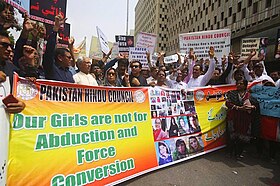In the majorly Sunni Muslim country of Pakistan, forced conversions have become a focal point of concern. This ongoing human rights issue has severely impacted Pakistan’s religious minorities, causing both national and international alarm. The minority communities seek to highlight the systemic challenges faced by these communities and advocate for meaningful reforms to protect their rights and freedoms.
The issue of forced conversions threatens not just to attack the religious identity of minority groups, but further seeks to undermine the autonomy of these individuals. This rings especially true with the conversions of women for marriage, where Muslim men forcefully marry and convert women from minority groups, thereby undermining their autonomy horrifically.
Understanding Forced Conversions in Pakistan
Forced conversions in Pakistan predominantly affect women and girls from minority communities, such as Hindus, Christians, and Sikhs. This often involves abduction, coercion into converting to Islam, and forced marriage, usually to the abductors themselves. Many victims are minors, making them especially vulnerable to exploitation.
The cases of two young Hindu girls illustrate the severity of this issue. In both cases, the victims were young girls forcibly converted and married off, despite legal prohibitions against underage marriage.
In 2012, Mirpur Mathelo, Sindh, Rinkle Kumari, a Hindu girl aged 17, was abducted and forcibly converted to Islam. Despite legal prohibitions against underage marriage, she was married off to her abductor. In 2020, Arzoo Raja, another young Hindu girl aged 13, faced a similar fate. She was abducted from the street outside her house in Karachi, forced to convert to Islam and marry her abductor Azhar Ali. Today, while their cases may have faded from public memory, these girls still continue to live with the trauma and consequences of their ordeals.

These coerced conversions often occur under severe duress, including threats of violence, exploitation of socio-economic vulnerabilities, or manipulation of the legal system. For instance, perpetrators frequently use threats to harm the victims’ families or leverage their lack of financial resources to exert control. Social and cultural pressures also contribute, as minority communities often face systemic discrimination and exclusion, further isolating them and complicating their access to justice.
The Morbid Reality of Forced Conversions
Recent reports suggest that nearly 1,000 Christian girls in Pakistan are forcibly converted to Islam every year. This figure marks a significant rise, with a 50% increase compared to 2019. The victims are often minors, and the process usually involves abduction, forced marriage, and conversion, with little legal recourse for the families. The issue reflects a broader pattern of religious persecution against minorities in Pakistan.
Police and State Response
The response from police and state authorities to forced conversions is often inadequate and, at times, complicit. Law enforcement often delays or avoids taking action, sometimes influenced by societal and religious biases. There are several instances where the police sides with perpetrators, either by pressuring victims to stay with their abductors or by dismissing cases altogether, citing the victims’ ‘consent’ under duress or reporting it as a ‘love marriage’ between the perpetrator and the victim.
The judicial system also faces criticism for not providing adequate protection to victims, with courts sometimes endorsing the conversions and marriages without fully considering the circumstances. The state has made some legislative attempts to address these issues, but implementation remains weak. There is a lack of specific laws that address the nuances of forced conversions and protect the rights of minorities, making it challenging to prosecute offenders effectively. The absence of protective shelters and support services further exacerbates the situation, leaving victims without recourse.
Further, this systemic failure is compounded by a lack of reliable data, as many incidents go unreported due to fear of retaliation or are dismissed by authorities, leaving victims trapped in abusive situations without recourse.
International Response
The international community has expressed deep concern over the situation of forced conversions in Pakistan, particularly regarding the rights of religious minorities. Human rights organizations and foreign governments have frequently urged Pakistan to uphold and protect these rights. The United States Commission on International Religious Freedom (USCIRF) has consistently highlighted Pakistan’s shortcomings in safeguarding its minority populations.
In April, United Nations (UN) human rights experts issued a statement from Geneva, drawing attention to the plight of Christian and Hindu girls in Pakistan. They emphasized the vulnerabilities these girls face, including forced religious conversion, abduction, trafficking, child and early marriage, domestic servitude, and sexual violence.
The response from the international community serves to pressure the Pakistani government to take more decisive action in addressing these human rights violations. Despite the global outcry, effective measures to curb these abuses remain insufficient, highlighting the need for continued advocacy and reform.
A Better Future for All
Looking forward, the recent outbursts from minority groups, such as marches and protests signify a critical turning point and a call for Pakistan to reflect on and address these deeply entrenched issues. While the community actions seek a way to raise awareness, they also emphasize the need for tangible actions and reforms. The demands put forth by the minority community are not just aspirations but essential steps toward ensuring justice and equality for all citizens, regardless of their faith.
Related Stories
Mass Arrests Made Following Violent Attacks on Christian Community; Punjab Police Takes Swift Action
















